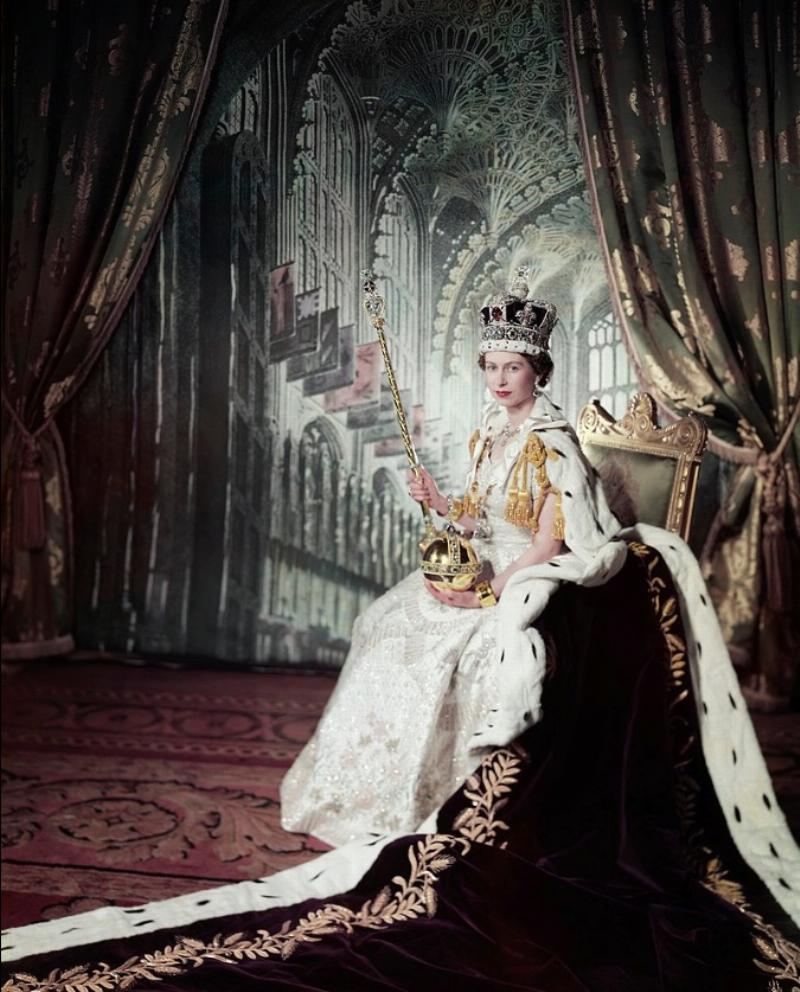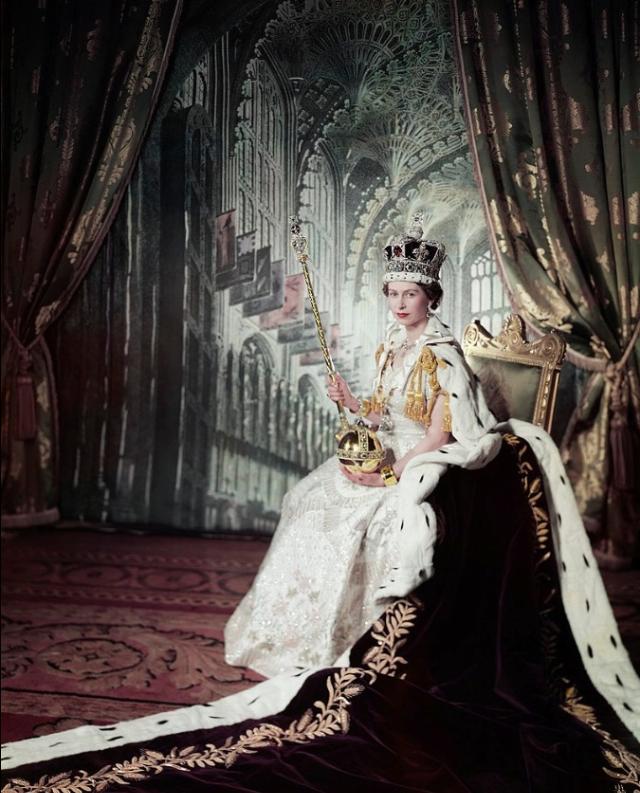


The British monarchy stands as a symbol of national continuity, tradition, and sovereignty. At its heart lies the Coronation Oath, a solemn vow the monarch makes to rule according to law and custom, to maintain the Protestant religion, and to uphold the rights and freedoms of the realm. This oath, taken before God and country, is more than a ceremonial rite; it is a pledge to defend British sovereignty and constitutional heritage.
When Elizabeth II swore it in 1953, she became a sovereign with duties, largely symbolic, rooted in a profound historical and moral responsibility. Throughout her 70-year reign, the longest in British history, she was admired for her personal dignity, sense of duty, and unflagging service to the nation. Yet as history unfolds and scrutiny sharpens, some question whether she truly upheld the responsibilities that came with that sacred oath, particularly regarding Britain’s sovereignty and identity.

Queen Elizabeth II’s coronation portrait. Public domain.
One of the most significant challenges to British sovereignty during her reign was membership in what evolved into the European Union. Critics argue that the pooling of sovereignty, economically and diplomatically desirable to the Establishment, was antithetical to the principles enshrined in the British constitution and incompatible with the role of a sovereign monarch.
During these years of deep constitutional transformation, Elizabeth II remained silent. While it is true that the monarchy is constitutionally bound to political neutrality, it retains certain residual powers and an advisory role with the government. A sovereign who took a solemn oath to uphold British laws and customs might have found cause, at the very least, to express concern or to ask whether the erosion of parliamentary supremacy and legal autonomy was in the national interest.
Her defenders argue that her silence was a necessary element of the monarchy’s impartiality, but others see it as a dereliction of her sacred duty. By failing to voice any resistance towards the ceding of legal and political power to a supranational body, Elizabeth II is increasingly viewed as having failed in her obligation to defend the sovereignty of her people.
The Brexit referendum of 2016 reopened these wounds. After decades of growing Euroscepticism, the British people voted to leave the European Union in an unmistakable assertion of national identity and a demand for the restoration of sovereignty. This was met with fierce resistance from the Establishment, including Parliament, the civil service, the judiciary, and the media.
Amid what amounted to a betrayal of the People’s wishes, the monarch again remained silent. No concern for the democratic will of the people, no recognition of the concern that Brexit was being subverted by procedural obfuscation and ‘elite’ intransigence. The Queen continued to fulfil her ceremonial duties and offered general words of unity, but there was no signal from the Crown that the democratic mandate of the people was being usurped or that it should be defended. Substantial numbers of Britons felt that this failure even to acknowledge the legitimacy of the vote’s outcome was another betrayal from an institution they believed existed to guard the nation’s core values.
Perhaps even more contentious than Britain’s relationship with Europe is the debate over immigration and multiculturalism, which have transformed the social and cultural landscape over the past half-century. Successive governments pursued policies that saw millions of people settle in Britain from across the globe, radically altering the demographics of many towns and cities.
To non-woke people, mass immigration was not merely demographic but also cultural, eroding the common values and historical identity that had bound the nation together, effectively abandoning the British culture that most wanted preserved. Instead of integration, we got fragmentation, with entire communities living parallel lives, and cohesion taking a backseat to diversity metrics. Once again, the monarchy remained silent, despite this being imposed on a very reluctant people.
However, it cannot be denied that Elizabeth II remained popular and widely respected, even among those who questioned the institution she represented. Her presence offered a sense of continuity in a rapidly changing world and a period of extraordinary transformation in British society.
In many ways, she was the embodiment of the monarchy’s best qualities: service without vanity, tradition without nostalgia, and dignity without arrogance. Yet this does not mean that she fulfilled her role, and there are those who argue that she allowed the monarchy to drift into a purely ceremonial role, withdrawing from its historical one as a constitutional safeguard.
With the passing of Elizabeth II and the accession of Charles III, the monarchy finds itself in uncertain waters. Unlike his mother Charles has long been opinionated, broadly aligning with progressive politics. His association with the World Economic Forum and his outspoken support for environmental causes such as “The Great Reset” have alarmed those who see these movements as elitist and undemocratic.
To many, Charles is not a neutral guardian of national unity, but a rather dim “woke puppet” whose values reflect those of the globalist elite more than those of ordinary Britons. His support for climate change activism and his flirtation with Islam place him in a perilous position: neither above politics nor within it. In a time when trust in institutions is vanishing, Charles commands neither the respect nor the affection his mother enjoyed.
Prince William, now Prince of Wales, has cultivated a more reserved image, contrasting with his father’s activism and his brother’s notoriety. However, his engagement with modern political fashion, from mental health to diversity, could be mere brand management, or they could be core values. He might grow into the role, but he currently evokes little of the loyalty or reverence his grandmother enjoyed.
As for Prince Harry, America is welcome to him.
Despite criticism, there is little appetite in Britain for a republican system, even among those disillusioned with Charles, as the alternative remains unpalatable. The idea of replacing the Crown with a presidency, especially one occupied by a figure like Tony Blair, is, for many, far worse than maintaining a flawed monarchy which, for all its failings, can offer something unique: continuity without power, symbolism without partisanship, identity without ideology. A president, by contrast, would be either a political figure or an empty technocrat, neither of which commands much affection in Britain.
The British monarchy finds itself at a crossroads. Queen Elizabeth II, for all her virtues, failed to uphold her coronation oath, and her silence on sovereignty, Brexit, and the transformation of British society is viewed as a missed opportunity to exert the moral authority that only a monarch can.
Charles III inherited a throne and a trust that are increasingly fragile. Without the affection his mother enjoyed, and burdened by perceptions of political partiality, he risks alienating an already skeptical public. William might restore faith, but he contends with a monarchy unsure of its role in the modern world.
And yet the monarchy endures, mainly because the alternative seems worse. In an age of political polarisation, media manipulation, and cultural instability, the Crown remains a symbol, imperfect but still capable of uniting a diverse nation around a shared heritage. If Charles or William can cure themselves of the woke virus, the British people are likely to stick with the devil they know.
